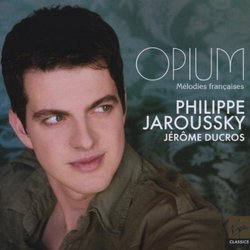Schmaltz is Schmaltz However Well-Sung
Giordano Bruno | Wherever I am, I am. | 05/22/2009
(5 out of 5 stars)
"I'm a raving fan of Philppe Jaroussky. That's why I bought this CD, with no clear idea of what was on it. The Belle Epoch repertoire of the 19th C is less familiar to me than 14th C Ars Subtilior or Balinese gamelan. Now that Jaroussky has made his case for it, I remember why I've shunned it. It's all scented doilies and antimacassars. It's the music Henry James ignored while gossiping with Oscar Wilde, if they ever met. It should be sung by someone who looks like a portrait by John Singer Sargeant. In short, it's maudlin and mannered. Yes, yes, it's quite artful, and musically it's not unsophisticated, but I just don't like it much.
Jaroussky sings it impeccably, perhaps better than anyone ever has. That's not necessarily a good thing. It seems to me that this repertoire requires an oxymoronic combination of naive sophistication. The singer needs to reek of over-ripe elegance, yet the musical technique can't sound too studied. Vocal polish is for proletarians.
And I confess that I'm uncomfortable with a male voice singing this salon-diva repertoire. That Sargeant portrait in my imagination is of a slender woman in gray silk. Jaroussky is a soprano, but his voice is ineluctably masculine; that's his greatest asset. On this CD, he dresses his superb voice in drag.
But "de gustibus non disputandum". It's clearly a five-star piece of work."
Magnificent
Dino Starcevic Rivera | San José, Costa Rica | 08/23/2009
(5 out of 5 stars)
"Also, I recognize to be a fan of Philippe Jaroussky. This CD will be on my 2009 best recordings list. One word: perfect. The voice of Jaroussky is at his best, and the execution is magnificent. Also, add the rarity of the french melodies registered.
A plus: the performances of Jerome Ducros (piano), Emmanuel Pahud (flute) and the Capucon brothers (violin and cello). They complete this true jewel."
Having a good voice does not help Philippe in these repertoi
A. F. S. Mui | HK | 02/17/2010
(3 out of 5 stars)
"Melodies francaises - with these, I think we are entering the territory of French art songs.
There are some top countertenors who specialises in art songs or lieder - to name but two outstanding ones, the musically superb Andreas Scholl (who could sing almost ANYTHING for an alto voice), and the quite wonderful male soprano Jorg Waschinski (who has recently released a Schumann lieder album).
As for Mr. Jaroussky, we are much more familiar with his post-renaissance and early baroque vocal repertoire, and he is justly famous for such works.
For a change, he issued this album from romantic and early contemproary composers of his native country.
I have heard some of the works here sung by other sopranos. To measure the success of Jaroussky's performance, one inevitably draws comparison from other soprano performances.
I personally have strong reservations for the ability of a countertenor or male soprano to 'substitute', so to speak, a woman soprano. The reason is simple - the countertenor technique employs a vastly different approach of vocal production from women sopranos. The countertenor focuses almost solely on the head voice, and the volume in this area is inevitably limited, lending very little room for dynamic expressions.
The same old problem certainly soils the performance in these works.
While the limitation in dynamic scope is not as apparent or important in baroque compositions and early music, which are mostly contrapuntal and do not require a vastly dynamic melodic line, in these romantic pieces the lack of a dynamic range rings its toll on even the best male soprano voice.
However, given such limitation, I am inclined to the view that the German counterpart of male soprano Jorg Waschinski is by comparison more able to express the musical requirements in his Schumann album than Jaroussky in this French album. And this is an interpretive and not purely vocal aspect that the serious listener must admit, even by the most ardent Jaroussky fan."


 Track Listings (24) - Disc #1
Track Listings (24) - Disc #1